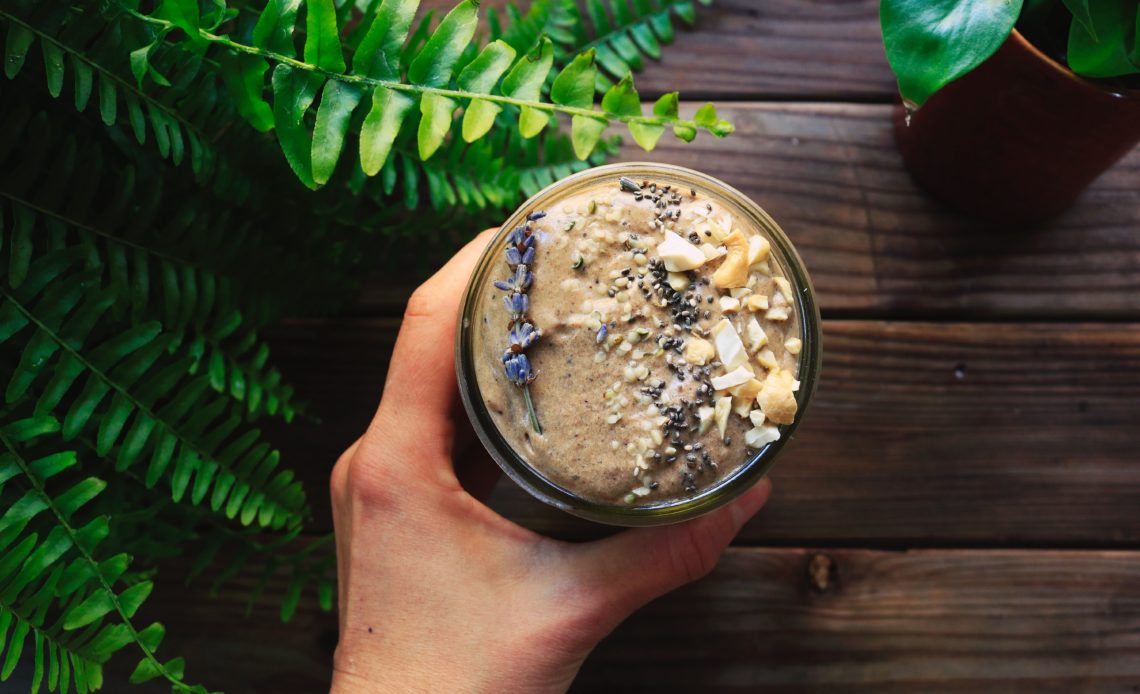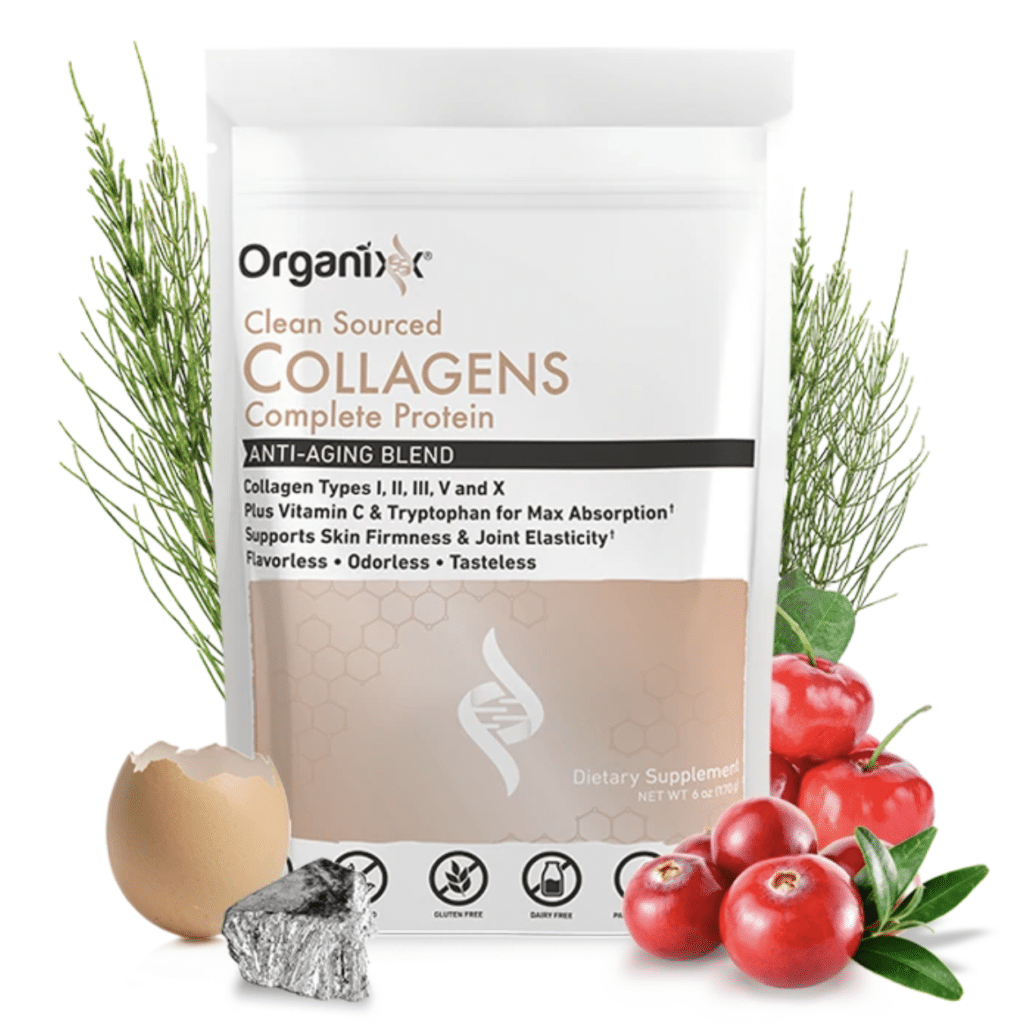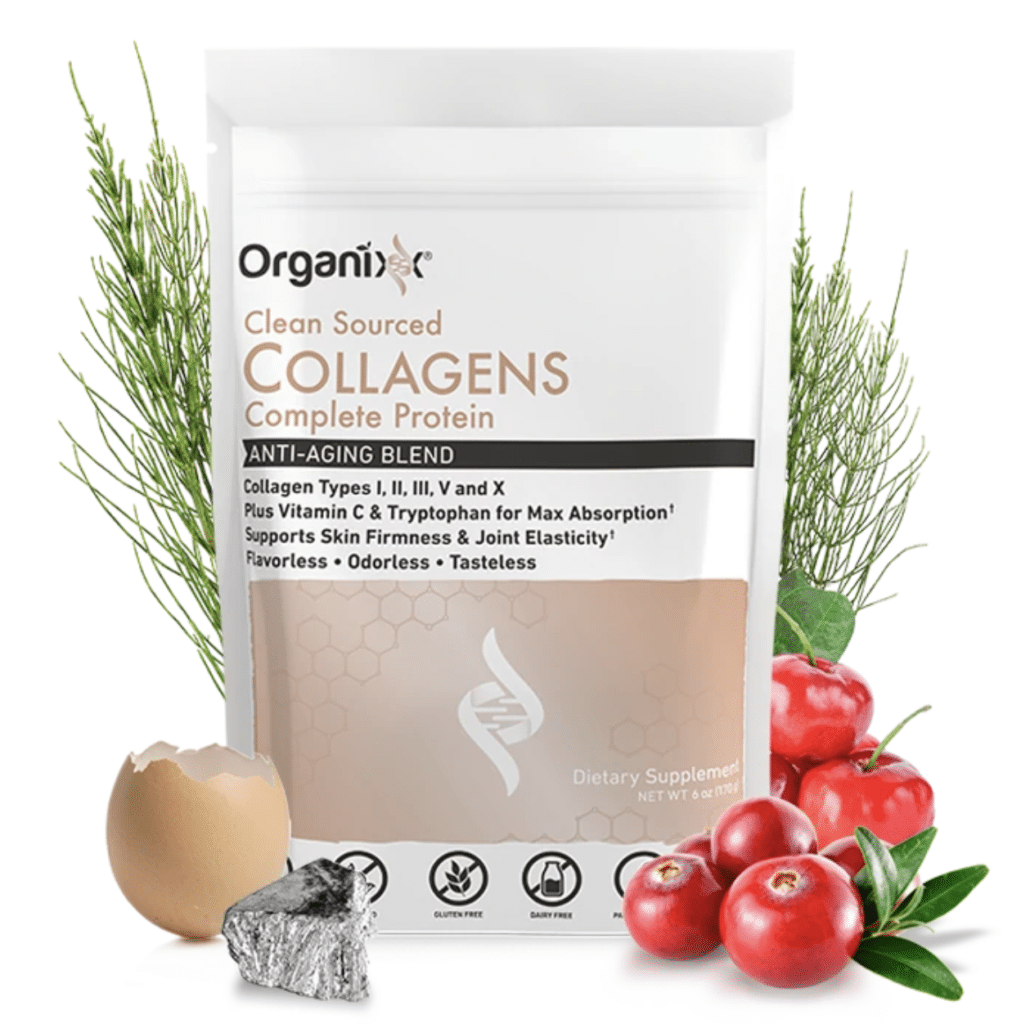

Our Editors’ Choice
Organixx Clean Sourced Collagen
Sourced from grass-fed and wild-caught fish. This antibiotic-free collagen source contains all five types of collagen, as well as Vitamin C and zinc for natural collagen production.
Unless you’ve been avoiding the grocery store for the last decade, you’ve heard of this buzzy ingredient. But do you know what all the noise is about? This collagen 101 guide is here to clue you in.
Before we get any further: Note that while research has shown that collagen supplementation can be beneficial from a skin-, joint-, and bone- health standpoint (more on these below), before taking any supplement you need to talk with your healthcare provider to make sure the supplement you’re eyeballing won’t interfere with any medications you’re already taking. This rule stands for collagen supplements.
What Is Collagen, Exactly?
The short answer: protein. Accounting for about third of the structural protein in the animal bodies (yes, this includes humans!) collagen acts as super-glue holding our connective tissues (i.e. hair, skin, nails, muscles, and blood vessels) together.
In fact, according to Dr. Josh Axe, D.N.M., C.N.S., D.C., founder of Ancient Nutrition and author of the best-selling book COLLAGEN DIET, collagen is the second most common substance found in the body—second only to water.
The Five Main Types of Collagen
Generally, when people talk about collagen they are referring specifically to Type 1 collagen, which is the type responsible for keeping our bones dense, skin healthy, and tendons, ligaments, and organs structurally sound. But, the body actually contains 27 other types, four of which are also common.
Type III collagen works with Type I to keep our skin and blood vessels elastic. Type II collagen is found in our cartilage and joints. There are also lesser-abundant types like Type V and Type X which have more specialized roles such as keeping placentas strong (Type V) and assisting bone formation (Type X).
Why We Need Collagen Supplements
“When there’s enough collagen in the body, we can keep ourselves together and humming along,” says Dr. Axe. The problem? By our early to mid twenties, our body naturally begins to pump out less and less collagen. Meaning that by the time they reach age 50, people almost halved their collagen levels.
Don’t be too alarmed. Registered dietician Allie Lansman, RDN, LD, founder of The Freelance RD assures: “This decline is completely normal and a natural part of human aging.” But this dip is also one of the (if not THE) main reasons wrinkles, joint issues, and brittle bones set in as the number of birthday’s we’ve celebrated climbs.
Knowing this, it’s easy to understand why collagen supplements have garnered so much attention. Luckily, health experts and research say they actually work.
Wondering how? Well, like all kinds of protein, collagen protein is made up of itty-bitty building blocks called amino acids, explains Licensed Medical Acupuncturist and Holistic Health Expert Jamie Bacharach, Head of Practice, at Acupuncture Jerusalem. When we ingest collagen protein, the gastrointestinal tract breaks it down into amino acids which get absorbed into our bloodstream distributed throughout the body.
It’s not “whole” collagen protein molecules that are getting used by the body, she says. “It’s protein’s building blocks—amino acids—that are giving us the benefit.”
Our Recommendation For The Best Collagen Powder You Can Buy On The Market Today
Introducing the only collagen product on the list with all five types of collagen: Clean Sourced Collagens. By combining collagen sourced from four different sources (beef, fish, antibiotic-free chicken, and eggshell membranes), this powder provides more different types of collagen than any other product on this list. What makes this option especially noteworthy however is that it’s formulated with 140 grams per serving of tryptophan, making it a complete protein source. Meaning, it’s an A+ option post-workout.

Types I, II, III, V, and X
Organixx Clean Sourced Collagen
Best grass-fed, wild-caught, antibiotic-free collagen source
- 8.5 grams collagen per serving
- 20 1-scoop servings per package
- 8 grams of protein, 0 grams of sugar, 35 calories per serving
- Type I, Type II, Type III, Type V, and Type X
- Combines Bovine collagen, marine collagen, antibiotic-free chicken collagen, and eggshell membrane collagen
- Added tryptophan to become complete protein
- Contains Vitamin C and zinc for natural collagen production
- Non-GMO, yeast-free, preservatives-free, starch-free, gluten-free, dairy-free
- Discount available with monthly subscription
- Eco-friendly packaging
The Different Types Of Collagen Supplements
In addition to types of collagen, there are sources of collagen: bovine collagen, marine collagen, chicken collagen, eggshell membrane collagen, or plant-based collagen.
Most collagen supplement labels will include both the type of collagen and the source. But if not, your particular goal in supplementing should be your guiding factor.
Dr. Axe explains: Bovine and marine collagen supplements are both packed with Type I and Type III collagen. So, if you’re looking to reap skin, bone, or muscle health benefits, you want a collagen supplement with both types. If however, you’re interested in improving your joint health, he recommends chicken collagen which is rich in Type II collagen, or egg membrane collagen, which is abundant in Type V.
Collagen supplements are available in three forms: peptides (powder), gelatin, and raw. As of yet, there’s been limited research comparing the bioavailability of these forms in humans. Though, one small 2019 study published in Frontiers In Nutrition suggests that there’s no difference in bioavailability between peptides and gelatin.
The 5 Main Benefits Of Collagen Supplements
1. Decreased Wrinkle-Depth
Sashay down the cosmetic aisle of your local CVS and you’ll notice a handful of topical products with collagen claiming to improve skin appearance. To paraphrase dermatologist Heather Woolery-Lloyd, MD, founder of Specific Beauty, a skincare line formulated to brighten and correct dark spots in melanin-rich skin, these products are a hoax.
“Topical collagen products may offer moisturization,” she says. “But the collagen in topical skincare products are too large to penetrate the skin’s top layer.”
Where you might find success, however, is the supplement aisle.
“There are a few published studies demonstrating skin benefits from oral collagen consumption,” says Dr. Woolery-Lloyd. For instance, in one 2018 study published in the journal Nutrients, found that those who supplemented with 100 mg of collagen peptides once daily for 12 weeks showed improved skin hydration and elasticity, reduced wrinkling and elasticity compared to those who supplemented with the placebo.
A second, larger study published in 2015 in the Journal of Cosmetic Dermatology had similar findings, with researchers concluding that oral supplementation of collagen peptides “is efficacious to improve hallmarks of skin aging.”
And so did a third, which studied a commercial available collagen product known as Verisol® (info on where to purchase this supplement below).
2. Reduced Appearance Of Cellulite
It’s not just the skin on your face collagen supports. As it happens, collagen may also help reduce the appearance of cellulite.
For example, in one 2015 study published in the Journal of Medicinal Food, 105 women were split into two groups: Those who received bioactive collagen peptides and those who received a placebo. These participants’ cellulite was measured at start, and then again after three and six months.
The findings? Those who consumed collagen showed a statistically significant decrease in the degree of cellulite, reduced skin “waviness” on thighs, and improved dermal density compared to those on the placebo.
3. Slashed Joint Pain And Stiffness
Yes and yes. At time of publication, there have only been a few studies published on the topic. But all have pointed towards a positive benefit.
One study in the Journal of International Society of Sports Nutrition in 2013, for instance, found that people with joint pain or mobility who supplemented with Type II collagen—again, that’s the type found in (and good for) your joints—for 4 consecutive months significantly improved joint function.
In fact, research published in the Journal of The Science of Food and Agriculture in 2014 found that collagen supplementation can actually reduce symptoms of osteoarthritis—a condition that marked by the degeneration of joint cartilage that causes pain and stiffness, especially in the hip, knee, and thumb joints—in as little as 13 weeks.
Some good news for athletes: Other research published in 2008 in Current Medical Research and Opinion found that when college athletes consistently supplemented with collagen for 24 weeks, they saw a reduction in performance-limiting joint pain. In other words, you don’t have to celebrate a quarter-century on earth or already suffer from joint ailments to reap the joint perks of the buzzy ingredient.
4. Bolstered Bone Density
Just as the claims that collagen supports joint health are supported, so too are those that saying collagen benefits bone density.
Case and point: One study published in Nutrients in 2018 found that 12 months of daily collagen peptide supplementation increased the bone mineral density in postmenopausal women with primary, age-related reduction of bone density.
Another study also found that collagen supplementation may improve bone density, though there was no consensus on dosage or time-frame.
5. May Support Overall Muscle Mass
“Whenever we think about supporting muscle mass, protein is essential,” says Lansman.
While there’s no research showing that collage protein powder is better than any kind of protein powder from a muscle-preservation standpoint, one small study published in the Journal of the American Dietetic Association, did find that collagen supplementation preserved lean muscle in women over the age of 70.
It’s worth noting, however, that unlike other popular protein powders like whey and hemp, collagen is not a complete protein. Meaning, it does not contain nine of the essential amino acids our body needs to build muscle-supporting protein. Missing tryptophan, it only includes eight.
To reap collagen’s benefits and give your body all the aminos it needs to support muscle growth and recovery, many experts suggest opting for a collagen-whey protein mix. “You might also vary your protein throughout the day to guarantee that over the course of the day you’re getting all the aminos you need.”
How To Supplement With Collagen
Collagen is not a shot of espresso or smear of concealer. You won’t be able to feel or see it’s benefits immediately. On the contrary, it’s generally going to take two to six months of consistent collagen ingestion for benefit.
Though what your intention is may decrease or increase your expected timeline. For instance, improved skin appearance was documented in one study to appear in as little as four weeks, while improved bone density may take up to twelve months.
Guidance on effective daily dosages varies by type of collagen. For instance, researchers have found that an effective daily dose for Types I and III is between 2.5g and 10g. For Type II collagen, you can go with a much smaller dose per day of 40mg.
Many collagen protein supplements contain other ingredients. To know exactly how much collagen you’re getting, read the ingredient list carefully.
Photo by Chelsea shapouri on Unsplash
